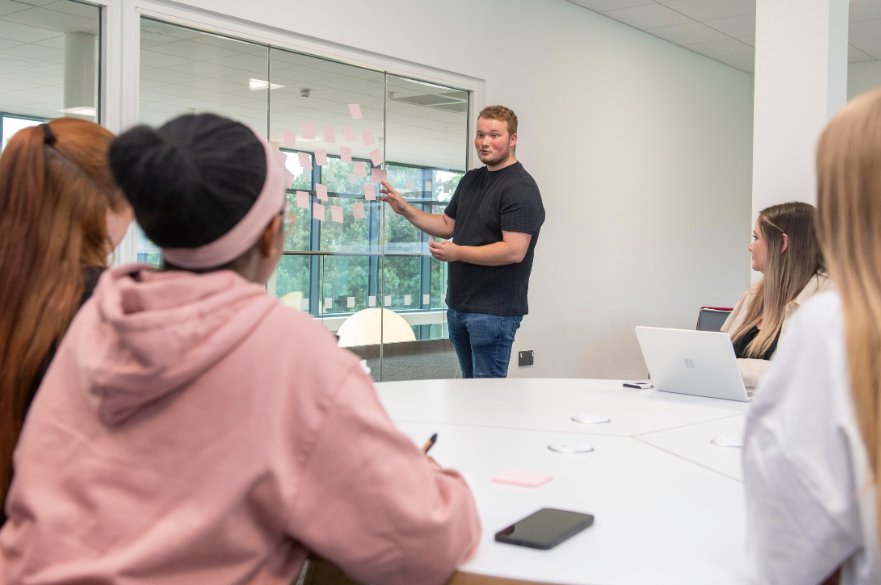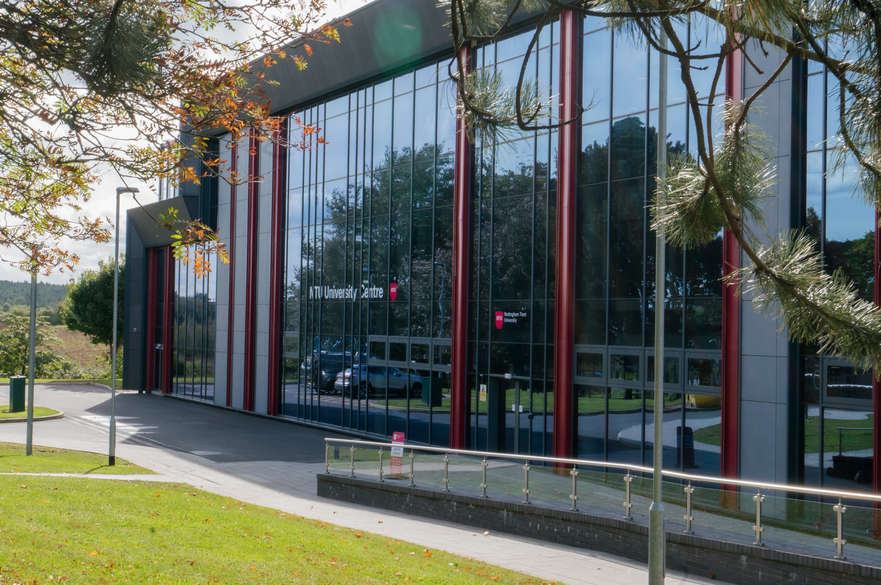Working with Children, Young People and Families (top-up) - NTU in Mansfield BA (Hons)
UCAS code: L533
About this course
The Working with Children, Young People and Families (Level 6) course is designed for you if you are an FdA graduate and want to top up your qualification to BA honours degree level.
If you're planning a future improving the lives of families, young people and children, you'll gain the tools you need to make a difference to those in need of support.
Taught at NTU in Mansfield, this course links academic learning with hands-on research and practice. With a focus on real-world learning, you’ll cover a range of contemporary issues from an organisational and leadership perspective.
This additional year of study will further develop your knowledge and skills of work practices related to children, young people and families, opening up rewarding career opportunities in the sector, as well as options for further study.
-
Top up your sector-related FdA, to BA honours degree level on this one-year course.
-
On completing this degree you’ll be well-placed to take up a variety of careers within the sector or go on to further study.
-
Strong links to vocational practice and improving the lives of the children, young people and families.
-
NTU in Mansfield is your alternative route into higher education. We've built this qualification with the local job market in mind. Each of our higher education courses is relevant, hands-on and work-focused.
What you’ll study
The course is designed to build on the principles of the foundation degree (and equivalent) programmes. There are strong links to vocational practice and improving the lives of the children, young people and families our graduates will work with is at the heart of the course. There are five Level 6 modules on this course.
Project Management and Research in Practice (40 Credit Points)
You will develop commercial and organisational awareness within the sector, through project managing a piece of research with a local employer. This module allows you to design and generate a research project informed by an awareness of methodological debates within the social sciences.
Voice, Choice and Power (20 Credit Points)
This module encourages students to consider how to centre the voice of the service user within organisations. It explores the power and influence of decision makers and how minority voices may become marginalised. You will critically analyse how agency for children, young people and families is, and may be further provided for, within the sector.
Change Makers and Leaders (20 Credit Points)
You will identify and adopt the skills, approaches and styles of effective leadership required within differing organisational cultures. Leading teams, change management and quality management, evaluation and impact are explored in order to equip students for future employability. Students are encouraged to employ analytical knowledge of networks, system, policy and regulatory frameworks and how these are applied in leadership and staff supervision within children, young peoples and/or family services.
People and Place: Ethical and Sustainable Practice (20 Credit Points)
Students will explore how empowering people and ethical decision making can shift power dynamics to offer more sustainable futures for organisations, better knowledge management and robust community led networks. This modules enables students to critically evaluate values and principles, which promote equality, diversity, rights and responsibilities and their application to practice, supporting congruency for service users.
Contemporary Global Perspectives (20 Credit Points)
This module seeks to understand global citizenship, comparative global problems and practice based approaches. It explores concepts of social justice, social solidarity and social transformation and considers the impact of decolonising aid and organisational structures in under developed countries.
We regularly review and update our course content based on student and employer feedback, ensuring that all of our courses remain current and relevant. This may result in changes to module content or module availability in future years.
How you're taught
Teaching, learning and assessment will be varied, appealing to a diverse range of learners, and make use of technology in the form of electronic portfolios, blogs, and simulation suites.
You will develop essential transferable skills such as effective communication skills; analysing information; problem solving and decision making. You will have the opportunity to apply acquired knowledge through a variety of activities including classroom based, simulated and work related activities.
Careers and employability
Your future career
With a BA (Hons) Working with Children, Young People and Families qualification, there’s a wide range of careers that you could follow, including:
- Youth Development Leader
- Youth Support Worker
- Children’s Engagement and Participation Leader
- Family Support Worker
- Project Support Officer
- Women’s Support Worker
- Community Link Worker.
You may want to consider further study options to gain professional qualifications at Masters level for example MA Social Work, MA Youth Work Leadership and Practice or MA Career Guidance and Leadership.
Employability Team
At NTU in Mansfield, our award-winning Employability team is here to inspire and enhance your career planning, whichever path you choose. Whether you wish to go on to further study or to look for job opportunities, we can guide you to be a successful candidate.
Campus and facilities
As an NTU Mansfield student, you’ll benefit from the latest facilities and modern technology to support your studies and help you get the most out of student life.
We are continually investing in our facilities and enhancing our learning and teaching environment to make it an inspiring place for students.
Facilities and services include:
- University Centre
- Teaching and Learning Centre
- Library
- Dedicated study zones, including PC suites
- On-site café
- Social spaces
- Sports facilities
- Student Support Services
- Nottingham Trent Students Union (NTSU) drop-in events.
Entry requirements
UK students
Standard offer: Foundation degree in a sector-related area e.g. FdA Children and Young People; FdA Social Care; FdA Early Years Studies.
To find out what qualifications have tariff points, please use our tariff calculator.
Additional requirements for UK students
There are no additional requirements for this course.
Contextual offers
If you don’t quite meet our entry requirements, we might be able to make you a lower offer based on a range of factors, including your background (such as where you live and the school or college you attended), your experiences and your individual circumstances (you may have been in care, for example). This is called a contextual offer, and we get data from UCAS to help make these decisions. We do this because we believe everyone with the potential to succeed at NTU should have the opportunity to do so, no matter what barriers you may face.
Other qualifications and experience
NTU welcomes applications from students with non-standard qualifications and learning backgrounds, either for year one entry or for advanced standing beyond the start of a course into year 2 or beyond.
We consider study and/or credit achieved from a similar course at another institution (otherwise known as credit transfer), vocational and professional qualifications, and broader work or life experience.
Our Recognition of Prior Learning and Credit Transfer Policy outlines the process and options available for this route. If you wish to apply via Recognition of Prior Learning, please contact the central Admissions and Enquiries Team who will be able to support you through the process.
Getting in touch
If you need more help or information, get in touch through our enquiry form.
International students
This course is not suitable for tier 4 visa applicants.
We accept qualifications from schools, colleges and universities all over the world for entry onto our undergraduate and postgraduate degrees. If you’re not sure how your international qualification matches our course requirements please visit our international qualifications page.
Additional requirements for international students
There are no additional requirements for this course.
English language requirements
View our English language requirements for all courses, including alternative English language tests and country qualifications accepted by the University.
If you need help achieving the language requirements, we offer a Pre-Sessional English for Academic Purposes course on our City campus which is an intensive preparation course for academic study at NTU.
Other qualifications and experience
If you have the right level of qualifications, you may be able to start your Bachelors degree at NTU in year 2 or year 3. This is called ‘advanced standing’ entry and is decided on a case-by case basis after our assessment of your qualifications and experience.
You can view our Recognition of Prior Learning and Credit Transfer Policy which outlines the process and options available, such as recognising experiential learning and credit transfer.
Sign up for emails
Sign up to receive regular emails from the International Office. You'll hear about our news, scholarships and any upcoming events in your country with our expert regional teams.
Getting in touch
If you need advice about studying at NTU as an international student or how to apply, our international webpages are a great place to start. If you have any questions about your study options, your international qualifications, experience, grades or other results, please get in touch through our enquiry form. Our international teams are highly experienced in answering queries from students all over the world.
Policies
We strive to make our admissions procedures as fair and clear as possible. To find out more about how we make offers, visit our admissions policies page.







